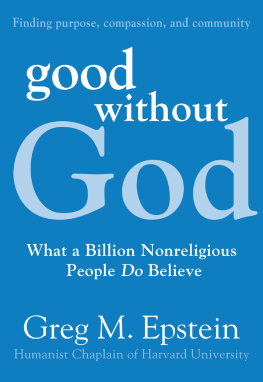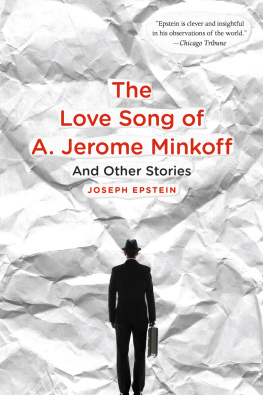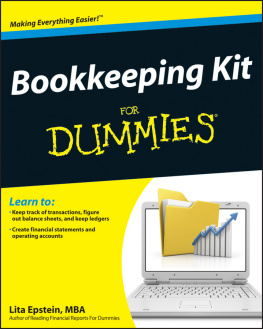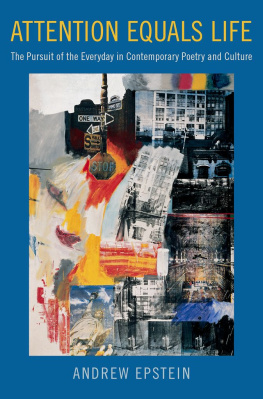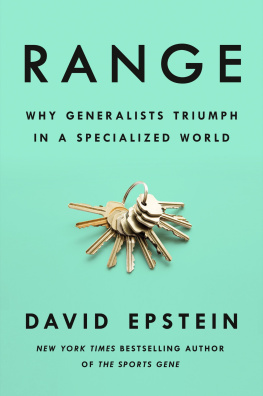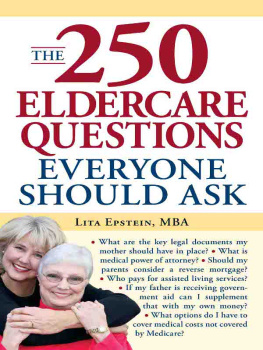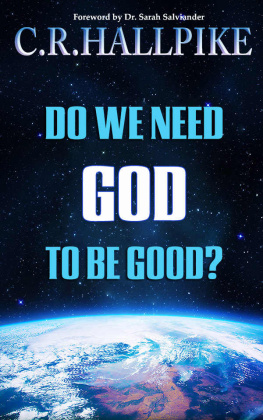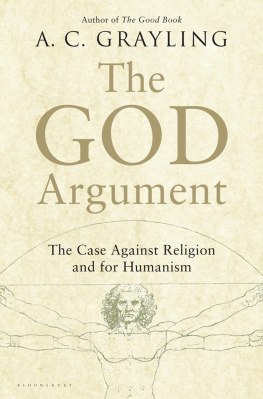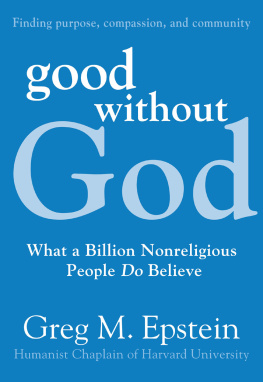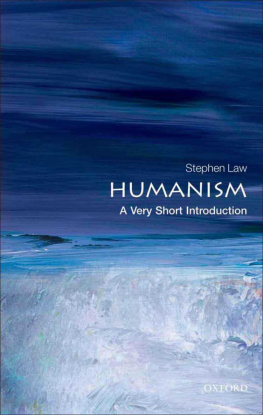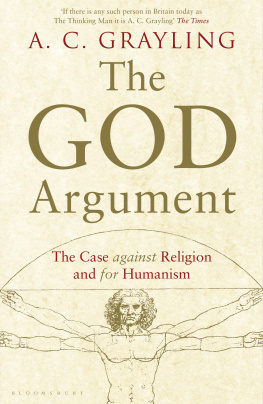Greg M. Epstein
My light is in me.
My hope is in me.
My strength is in meand in you .
Contents
Can We Be Good Without God?
A Brief History of Goodness Without God, or a Short Campus Tour of the University of Humanism
Why Be Good Without a God? Purpose and The Plague
Good Without God: A How-To Guide to the Ethics of Humanism
Pluralism: Can You Be Good with God?
Good Without God in Community: The Heart of Humanism
Humanism and Its Aspirations
Humanist and Secular Resources
Can You Be Good Without God?
T his is a book about Humanism. If youre not familiar with the word Humanism , it is, in short, goodness without God. This is a book about the values, the history, and the future of the worlds hundreds of millions of atheists, agnostics, and nonreligious people.
This is not a book about whether one can be good without God, because that question does not need to be answeredit needs to be rejected outright. To suggest that one cant be good without belief in God is not just an opinion, a mere curious musingit is a prejudice. It may even be discrimination. After all, would you ever ask: Is it possible to be a good person if youre Muslim? Or Buddhist? Or Jewish? Or Christian? Would you feel comfortable working for an employer who implied that all gays and lesbians were immoral? Or all Democrats? Or all Republicans? How would you feel if your daughter were planning to marry someone who claimed that all Catholics were lousy, unethical human beings? Or all Protestants? This is the sort of all-or-nothing condemnation of a huge population one is making if one suggests that goodness and morality require belief in a deity.
And its hardly a hypothetical suggestion: over decades of polling, a majority of Americans have consistently indicated a negative opinion of atheists and nonbelievers. Even in this enlightened twenty-first century, where weve proved ourselves ready for a black president and welcomed elected officials representing every group, approximately half of all Americans say they would refuse to vote for a well-qualified atheist candidate for public office. In other words, one out of every two Americans admits to being prejudiced against fellow citizens who dont believe in God. No other minority group in this country is rejected by such large numbers.1
This prejudice ought to concern us all. Because prejudice anywhere endangers not only its targets, but all who believe that we should be judged not by the color of our skin, or our gender, or sexuality, or by our religious preference or lack thereof, but by the content of our character. If we can convince ourselves today that one entire group comprising millions of people might be incapable of goodness, might be no good, then we harbor inside us the ability to turn against and hate any other group as well, and no one should feel safe.
It is not easy to live a good life or be a good personwith or without a god. The fact is that life is hard. Living well and being a good person are difficult to do. But that doesnt mean we should give ourselves permission to judge an entire group of people as incapable of goodness unless theyre being good the majoritys way.
Tolerant, fair-minded people of all religions or none do not dwell on the question of whether we can be good without God. The answer is yes. Period. Millions and millions of people are, every day. However, the question why we can be good without God is much more relevant and interesting. And the question of how we can be good without God is absolutely crucial. Those are the questions in this bookthe essential questions asked and answered by Humanism. I invite you to explore these questions, and Humanisms answers, with me.
Are You Religious?
I f youre not religiousif you dont believe in God, youre not sure you believe in God, or if you think you believe in some kind of higher power but you know you dont fit into any organized religionyoure not alone. Heres the good news: over a billion people around the world today are like you. All the major studies of world religious demographics, despite different methodologies, indicate that there are somewhere around one billion people on earth who define themselves as atheist, agnostic, or nonreligious. Even if we exclude the approximately half of nonreligious people who say they believe in some form of spiritthough I think it makes sense to include many of themthere are still more than half a billion people in the world who live without belief in God. And even in the United States of America, which were told is the most religious of all the worlds developed nations, the nonreligious now represent approximately 15 percent of the population, or approximately 40 million Americans. Nonreligious is the fastest growing religious preference in the United States, and the only one to have increased its percentage of the population in every one of the fifty states over the past generation. Almost one in four American young adults today has no religion, which suggests not only a growing trend but also that an even larger percentage of the United States as a whole may be secular in another generation. Granted, when pollsters ask Americans to identify themselves as atheists or agnostics, only a few million answer affirmatively. But those terms are attached to a stigma. When poll questions ask in a more roundabout way, such as Do you believe in God? the number who say no or not sure is much higher. And the number of Americans who dont expect to have a religious funeral is in the stratospherenearly a quarter of us.2
Whats more, theres plenty of evidence to suggest that nonreligious people are being good en masse. It has long been known that Humanists and nonreligious people have made extraordinary contributions to science and philosophy as well as to philanthropy and social justice. But sociologists have recently begun to pay more attention to the fact that some of the worlds most secular countries, such as those in Scandinavia, are among the least violent, best educated, and most likely to care for the poor.3 And as scientists are now beginning to document, though religion may have benefits for the brain, so may secularism and Humanism. Atheists meditating on positive secular images can gain the same benefits that religious people do from prayer. Strongly convinced nonbelievers may be among the least depressed peoplealong with strongly convinced believers. Nonreligious Americans have even been shown to be far more likely than regular churchgoing believers to oppose U.S. government-sponsored torture or advanced interrogation techniques.
Some say that all these people have nothing in common beyond their nonbeliefor that, because they dont call themselves by the same names or join the same organizations, we should not count or study them. This is nonsense. After all, Christianity is an incredibly diverse tradition as well, encompassing beliefs, customs, and organizations that range widely, from archliberal Unitarian Universalists in Cambridge, Massachusetts, to African American Baptists in Montgomery, Alabama, to Mormons in Salt Lake City, and far beyond. If we study Christianity as a big-tent tradition, or Hinduism (with its thousands of gods and traditions, which many of its followers have trouble agreeing upon), we have to study the nonreligious together as well. We may be a diverse group, but no more so than others.

